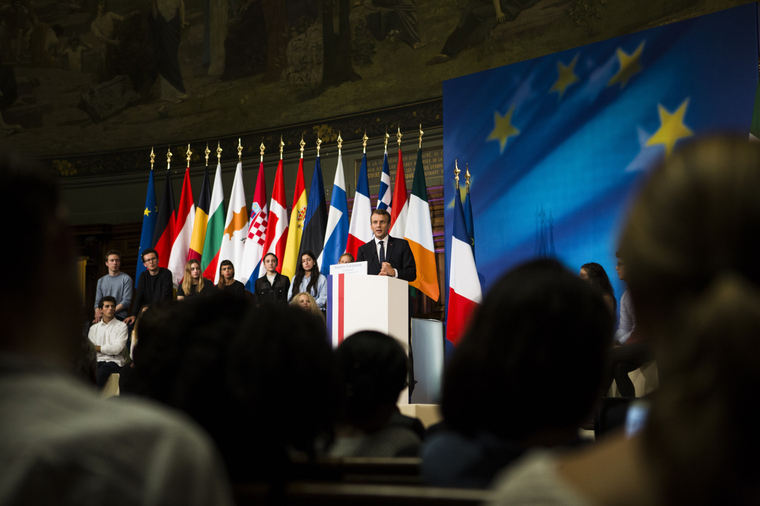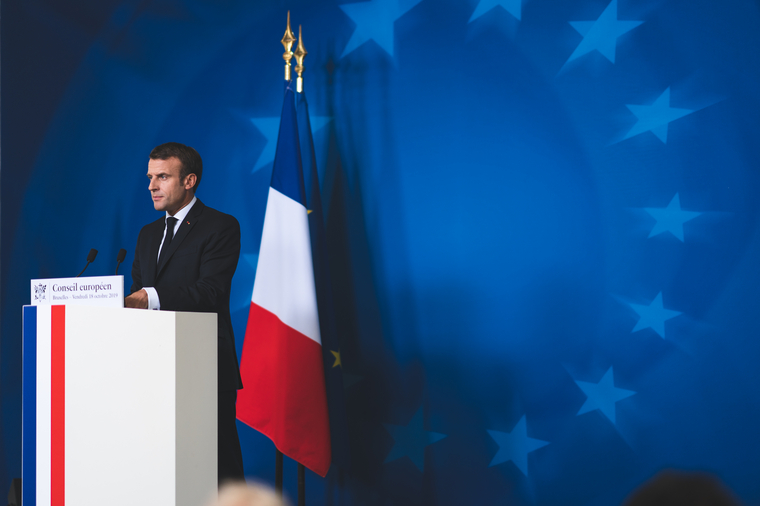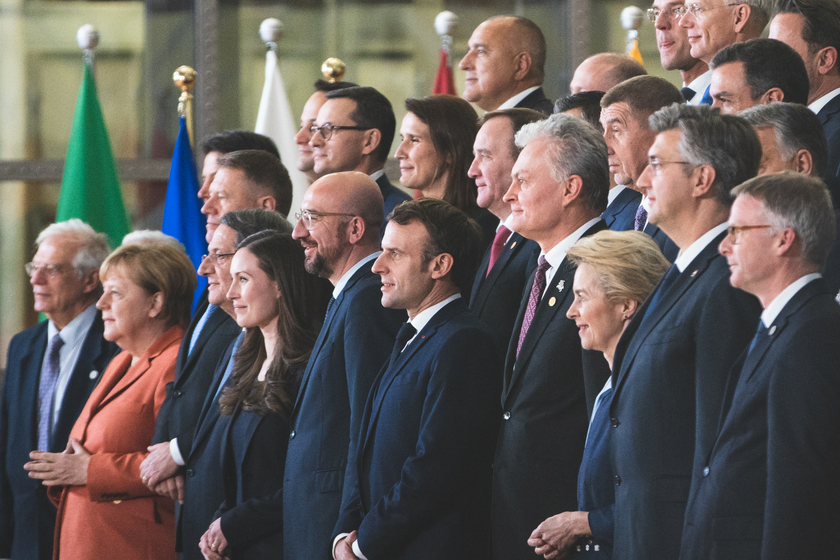On 26 September 2017, the President of the French Republic Emmanuel Macron presented his initiative for a sovereign, united and democratic Europe. On 4 March 2019, he made new proposals for a “European Renaissance”, addressing all European citizens. Here is the progress made on various European projects.
A EUROPE THAT PROTECTS
Common defence budget
With the launch of a European Defence Fund, which is now operational, the EU invested €500 million in 2019 and 2020, and will invest approximately €13 billion in the 2021-2027 period, in research projects in the field of defence and industrial development of defence technologies.
European Intervention Initiative
On 25 June 20018, nine States, including France, Germany, the United Kingdom and Spain, launched the European Intervention Initiative with the aim of building a common strategic culture among its members. Finland, Sweden, Norway and Italy have since joined. The E2I aims to facilitate the sharing of preparedness work and planning habits, experience in operations and joint deployments with our main partners.
Intelligence College in Europe
With a view to creating a culture of shared intelligence among Member States, the Intelligence College in Europe aims to provide awareness to European and national institutions on the challenges of intelligence. The first training session was held in Paris on 4 and 5 March 2019. Thirty European States took part in the session.
Fighting terrorist propaganda
In September 2018, the Commission proposed a new legislation to fight against illegal online content, in particular terrorist propaganda. It will force digital platforms to remove this type of content within an hour of its publication. It is a priority for new institutions that want to reach a final adoption of the text in the first half of 2020.
European Civil Protection Pool
A European Civil protection Pool, which is supported by a number of shared capabilities financed by the EU, has been fully operational since summer 2019. Greece called on it this summer for help fighting forest fires.

A EUROPE THAT ADDRESSES THE MIGRATION CHALLENGE
Gradual deployment of border police
The Commission set out a proposal to strengthen the capabilities of the European Border and Coast Guard Agency (Frontex) in order to enable it to create a permanent body of 10,000 EU border guards and to give it more power to return illegal immigrants to their countries of origin. This new legislation entered into force on 4 December 2019.
AN EXEMPLARY EUROPE REGARDING SUSTAINABLE DEVELOPMENT
A European Climate Bank
The ecological transition must also be a driver of growth for our economies and receive additional investment efforts. The creation of a European Climate Bank would help raise new funds, both public and private, that would match the scale of the challenges posed by the ecological transition. On 14 November, the European Investment Bank decided to ensure all its activities would be compatible with the Paris Agreement from the end of 2020 and to put an end to project financing in the fossil fuel industry, including natural gas, beginning in 2021. It will increase the share of financing dedicated to the ecological transition to reach 50% of its operations starting in 2025, thereby mobilizing €1,000 billion in investments for the ecological transition in the 2021-2030 period, which are necessary if we are to achieve carbon neutrality in 2050.
Video 10 May 2019, in Sibiu, Romania, a forward-looking Europe Day.
A carbon border tax
The creation of a carbon border tax (or “carbon adjustment mechanism”) aims to support the stepping-up of the European Union’s climate ambition in implementing the Paris Agreement while keeping European industries competitive. This mechanism would make it possible to apply the same environmental requirements as those that are applied to European industries on imports from countries that do not have carbon pricing systems or climate commitments equivalent to those of the EU. On 11 December, the European Commission proposed establishing a carbon border tax as part of the European Green Deal.
Environmental requirements central to trade agreements
In its European Green Deal, the Commission announced that it would propose making compliance with the Paris Agreement an essential component (and therefore a legally binding component) of future trade agreements.
A more transparent and independent European scientific assessment
With lessons learnt from the debates on the assessment of glyphosate, in early 2018 a review of the health and food safety assessment was put forward to ensure greater transparency and to make expertise more independent. This negotiation led to a reform – which is awaiting further additions – which provides for: greater transparency in assessments; greater independence in scientific expertise; strengthened governance by the European Food Safety Authority (EFSA) through internal representation of Member States, the European Parliament and civil society.
Effective energy interconnections
With the challenge of the energy transition, interconnections make it possible to capitalize on the complementarity of European electricity networks in order to supply safer, more affordable and more sustainable electricity. Spearheaded by the President of the French Republic, two projects were recently approved and will receive a significant subsidy from the European Commission. The Bay of Biscay electricity interconnection will double interconnection capacity between France and Spain. The Celtic Interconnector project will connect the Irish grid to the mainland European grid, via a 575-kilometre link between County Cork in Ireland and the Brittany region in France.
A EUROPE STANDING AS AN ECONOMIC AND MONETARY POWER
Strengthening the euro area
The momentum provided by the historic Franco-German agreement reached in Meseberg in June 2018 enabled the two countries to arrive at a tentative agreement on the creation of a euro area budget, called the Budgetary Instrument for Convergence and Competitiveness. It will strengthen investment and convergence between euro area economies to allow them to better withstand economic shocks and make the euro area more stable. Major progress has also been made in the completion of the banking union and the reform of the European Stability Mechanism.
Digital tax
Discussions to put an end to the undertaxation of major digital firms are underway at the OECD, and five EU Member States have already planned to levy a tax in their countries. The President of the European Commission is committed to supporting the efforts to reach a consensus at the OECD by the end of 2020, and if not, to propose a Europe-wide tax.
Fair competition
The President of the European Commission announced several measures to protect European companies from unfair competition. A European Chief Trade Enforcement Officer will be appointed to monitor and ensure compliance with trade commitments made by our partners, in particular concerning the environment and labour law. European competition rules will be reviewed to better factor in distortive competition linked to certain businesses supported or receiving subsidies from non-EU States.
Monitoring strategic investments
An agreement was reached to set up, for the first time, a European system to monitor investments from third countries in strategic sectors, in order to strengthen European economic sovereignty.
A EUROPE OF SOCIAL EQUITY
Regulating work postings
With the revision of the posted workers directive, which will enter into force in July 2020, we made progress in three main areas: limiting the duration of postings to 12 months (long-term postings run contrary to the very nature of postings and are a source of fraud), applying the “equal pay for equal work at the same workplace” principle and strengthening anti-fraud tools. A European Labour Authority was created in June 2019 to ensure the new rules are respected.
A decent minimum wage in all Member States
In March, the President of the Republic proposed creating a “social shield” to ensure equal pay at the same workplace and a minimum wage suited to each country. The European Commission announced that in the first 100 days of its term, it would present a proposal under which each worker within the European Union is entitled to an equitable minimum wage.
A EUROPE OF CULTURE AND EDUCATION
European universities
The European Union set an objective to create at least 20 European universities by 2024 to enable academic institutions to forge close partnerships for student mobility and excellence in education, research and innovation. The first call for projects issued by the European Commission made it possible to finance the 17 first European universities (in which 16 French universities are participating) from 2019 onwards. The French government has earmarked further funding to boost these projects.
Copyright
The directive on reforming copyright entered into force on 7 June 2019. It includes two fundamental advances: it creates a related right to copyright for publishers and press agencies, which will allow better remuneration for news publishers; and places more responsibility on platforms to ensure fair sharing of value from the publishing of works online, to benefit creators.
A EUROPE OF INNOVATION
European breakthrough innovation agency
A pilot project was launched for the 2019-2020 period to finance breakthrough innovation. A European Innovation Council will be created in the next multi-year budget to sustain and strengthen this financing.
An ambitious space policy
The European Union is gradually furthering its space policy by acquiring tools that will enable it to establish a policy on independent access to space (support for launch infrastructures - Europe’s Spaceport in French Guiana; support for research and innovation) and to consolidate its strategic independence. In their Declaration of Toulouse, France and Germany officially declared their support for a “European preference” for satellite launches (Ariane 6).
A PACT BETWEEN EUROPE AND AFRICA THAT LOOKS TO THE FUTURE
A Europe that looks to the future must work with Africa: a “pact for the future” at the European level should support Africa’s development ambitiously, by supporting private sector investment, fighting climate change together, multiplying university partnerships and supporting education for young girls. The European Commission will prepare a strategy on Africa ahead of the European Union-African Union summit in 2020.
A DEMOCRATIC EUROPE
Public consultations
In 2018, the Member States organized public consultations and the European Commission launched an online consultation based on a questionnaire drawn up by a panel of European citizens. The European summary of the consultations was discussed at the European Council in December 2018 and helped identify the priorities for the new European Parliament and the new European Commission.
Transnational lists in European elections
In the Meseberg declaration, Germany supported the creation of transnational lists for the 2024 European elections, which was also encouraged by the Heads of State and Government at the European Summit in February 2018. The Conference on the Future of Europe (see below) will provide an opportunity to look back on the topic ahead of the 2024 European elections.
Conference on the Future of Europe
A Conference on the Future of Europe, proposed by the President of the Republic and the President of the European Commission, will meet in early 2020 and for the following two years. It will include citizen panels, to reflect on the democratic functioning of the EU and how to strengthen Europe’s sovereignty in the EU’s major policies. It should produce tangible results, in a specific roadmap.

63 proposals made in the Sorbonne speech, and in the letter to Europeans from the President of the French Republic: 34 have been launched and finalized, 20 are currently underway, and 9 are in preparation.
Download the 3rd step in the initiative for Europe (.pdf)
Latest news
See all articles and topics-
6 January 2026 Joint Statement on Greenland.

-
6 January 2026 Paris Declaration - Robust Security Guarantees for a Solid and Lasting Peace in Ukraine.

-
9 January 2026 Leader’s Declaration of France, the United Kingdom and Germany on the situation in Iran.

-
18 January 2026 Statement by Denmark, Finland, France, Germany, the Netherlands, Norway, Sweden and the United Kingdom.

